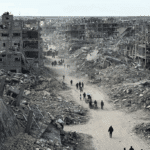Kinshasa, 15 December 2015 – On 14 December 2015, Mbandaka Military Court sentenced Chief Commissioner Jean-Jacques Koyo, one other police officer and three servicemen on charges of crimes against humanity for the atrocities committed in 2011 against the people of Bosanga, in the village of Yalisika (Equateur province). Avocats Sans Frontières (ASF) regrets that the Congolese judiciary did not take this opportunity to reassert its commitment to protecting populations affected by serious violations in connection with the exploitation of natural resources.
On the morning of 2 May 2011, the police forces of Chief Commissioner Jean-Jacques Koyo and some navy officers launched a massive attack against the people of Bosanga in the village of Yalisika. Since the start of the attack, the local population has reported that the Société Industrielle et Forestière du Congo (SIFORCO) was involved. Since 2005, SIFORCO has obtained rights to exploit local forest resources. It has, however, come into conflict with the local population by failing to respect its social commitments, even though these had been set down in a written agreement.
During the trial, 42 victims did not hesitate to defend their rights. Alongside other witnesses of the prosecution, they described the atrocities suffered, including arrest, torture, destruction of property and rape. They showed courage and determination in explaining how the attack had benefited from the logistical support of SIFORCO. The judges of the Military Court, however, ruled to overturn the charges of torture, as crimes against humanity, against J-J. Koyo and the four other defendants. They recommended a light sentence of two to three years of imprisonment, in contrast to the request by the public prosecution.
With regard to SIFORCO, the judges take note that, following the attack of 2 May 2011, SIFORCO had returned the property to the people of Bosanga, suggesting therefore that it had already remediated the damages. The victims’ lawyers were surprised to see the judges finally rule out any other involvement by SIFORCO, especially in the acts of torture.
“This trial was certainly not directed against the industries which invest in the country. On the contrary, the exploitation of natural resources is one of the key components of the country’s economic development,” explains Dominique Kamuandu, International Justice Programme Coordinator. “But this economic development must be provided alongside complete respect for the rights of local populations. Unfortunately, today’s judgment failed to support this. It is a missed opportunity.”
ASF encourages the public prosecutor to continue efforts to bring to light the grave violations committed in this case.
“If the judiciary fails to establish the liability of the various parties, it will exacerbate the victims’ trauma and frustration. The role of the judiciary is to promote social peace and guarantee legal protection for the population,” says Dominique Kamuandu, International Justice Programme Coordinator.
Under its mandate to provide access to justice to persons in vulnerable situations, ASF will continue to follow the case closely.
Cover picture: court audition of the proces in July 2015 © ASF/J. Léon



